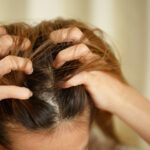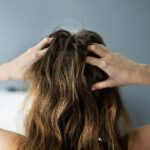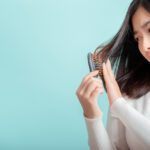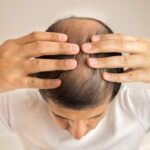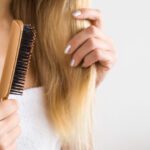How can I get my hair to grow faster with photobiomodulation?

Photobiomodulation (PBM) is an innovative technology that uses specific wavelengths of light to stimulate the body's cells. This non-invasive treatment is used in a variety of fields to improve well-being, including promoting hair regrowth. In this article, we'll explore how photobiomodulation sessions can help accelerate hair growth and how a good diet can support this process.
Photobiomodulation: effective support for hair growth
Photobiomodulation uses LED lights and lasers to target hair follicles and stimulate hair regrowth. PBM sessions involve exposing the scalp to specific lights that penetrate the skin and follicle layers. These lights can help improve blood circulation and cell regeneration, which can promote faster, healthier hair growth.
Photobiomodulation sessions for hair regrowth
Photobiomodulation sessions can be carried out as a course of treatment to maximize results. In general, a photobiomodulation session involves exposing the scalp to LED or laser light for a set period of time, usually between 10 and 30 minutes. The frequency of sessions can vary according to individual needs, but a regular protocol is often recommended for best results.
The LED lights and lasers used in photobiomodulation emit specific wavelengths that can penetrate to the hair follicles. This light exposure can help reduce inflammation and stimulate blood circulation in the scalp. By improving blood circulation, hair follicles receive more nutrients and oxygen, which can promote faster, healthier hair growth.
The benefits of photobiomodulation for capillary well-being
- Improved blood circulation: Photobiomodulation helps increase blood flow to hair follicles, which can promote faster hair growth.
- Follicle stimulation: the specific wavelengths used in LED lights and lasers can stimulate hair follicles, encouraging hair regrowth.
- Reduced inflammation: Photobiomodulation can help reduce scalp inflammation, creating a healthier environment for hair growth.
- Non-invasive: This treatment is non-invasive and painless, offering a safe alternative to more aggressive methods.
The role of good nutrition in hair growth
In addition to photobiomodulation sessions, a balanced diet is essential to support hair growth. Nutrients such as vitamins, minerals and proteins play a crucial role in hair follicle health.
Foods to promote hair growth
- Protein: Hair is composed mainly of keratin, a protein. Eating protein-rich foods such as fish, eggs, legumes and lean meat can help strengthen hair follicles.
- Vitamins: Vitamins A, C, D and E are essential for healthy hair. Green vegetables, fruit, nuts and seeds are good sources of these vitamins.
- Minerals: Zinc and iron are particularly important for hair growth. Seafood, spinach and red meats can help meet the need for these minerals.
- Omega-3 fatty acids: These fatty acids, found in oily fish like salmon and walnuts, can help maintain a healthy scalp.
Eating habits to support hair growth
- Hydration: Drinking enough water every day is essential to keep the scalp hydrated and promote healthy hair growth.
- Avoid restrictive diets: Nutrient-poor diets can affect hair health. It's important to follow a balanced diet to provide hair follicles with all the nutrients they need.
- Food supplements: In certain cases, food supplements can be recommended to make up for nutritional deficiencies and support hair growth.
The results expected from photobiomodulation and good nutrition
The results of photobiomodulation can vary according to each individual. However, many people experience a noticeable improvement in hair density and quality after several sessions of PBM combined with a balanced diet.
Factors influencing results
- Frequency of sessions: Following a regular protocol of photobiomodulation sessions is essential for optimal results.
- Duration of treatment: Patience is important, as hair growth can take time. Results can be seen after several months of regular care.
- Diet quality: A diet rich in essential nutrients supports hair health and can improve the results of photobiomodulation sessions.
- General health: Underlying medical conditions and genetic factors can also influence hair growth.
In conclusion, photobiomodulation can be an effective tool for supporting hair growth. By combining photobiomodulation sessions with a balanced diet, it is possible to optimize results and promote denser, healthier hair.

